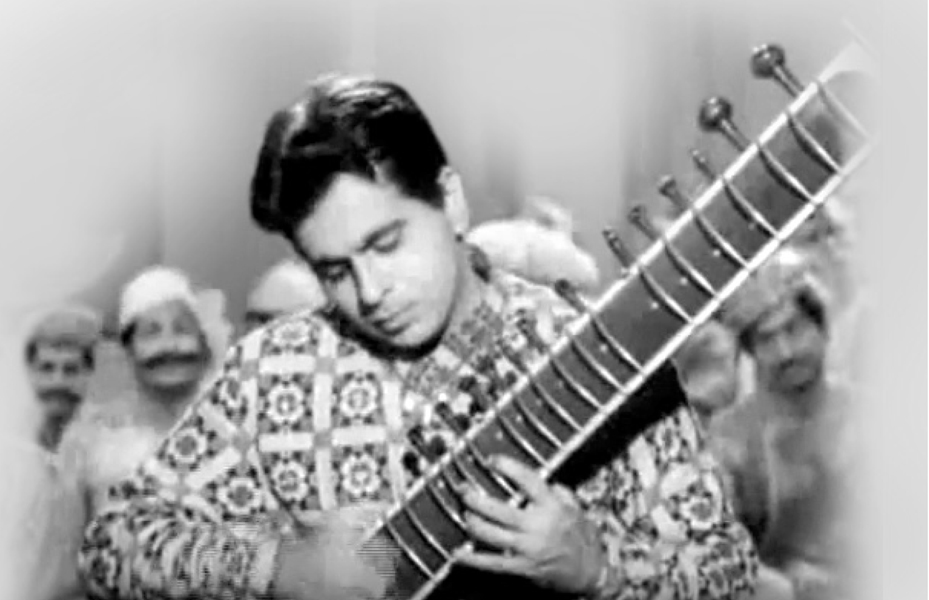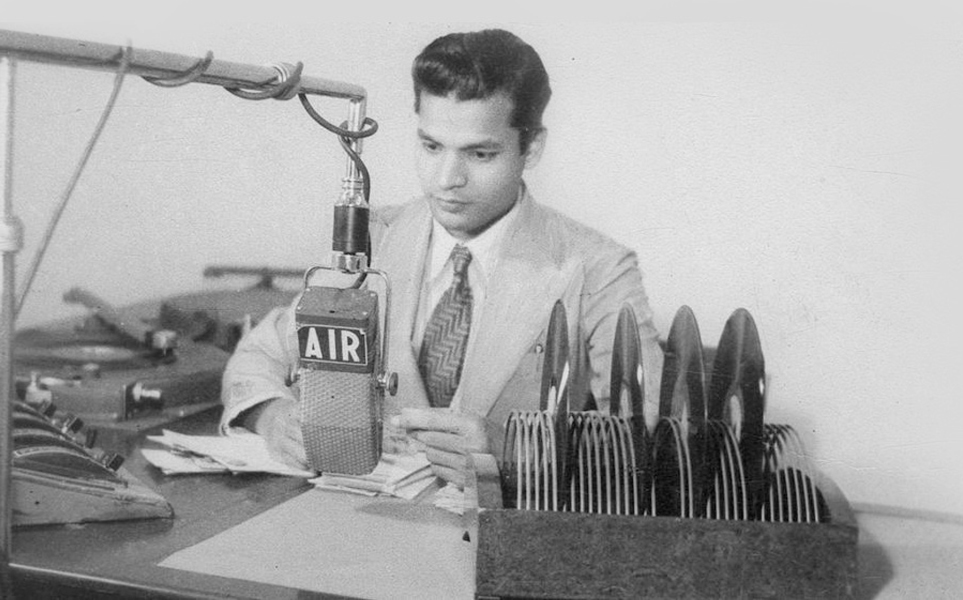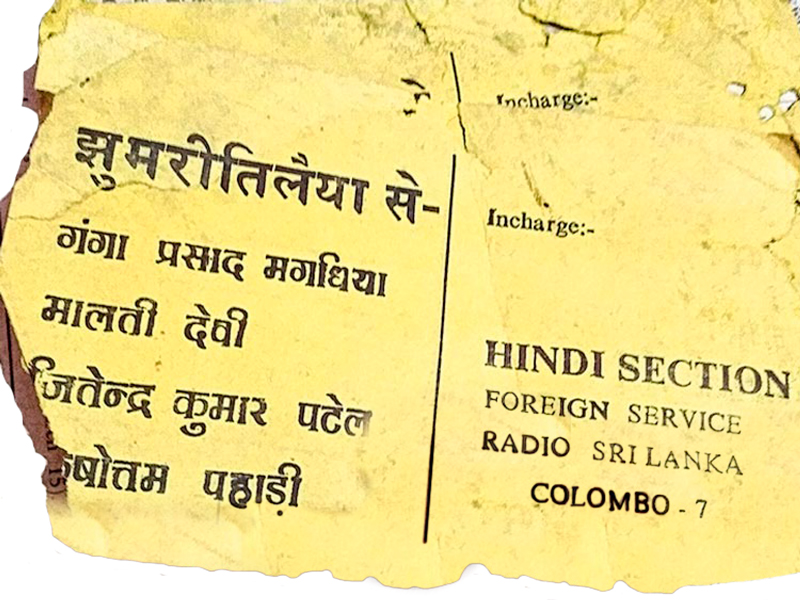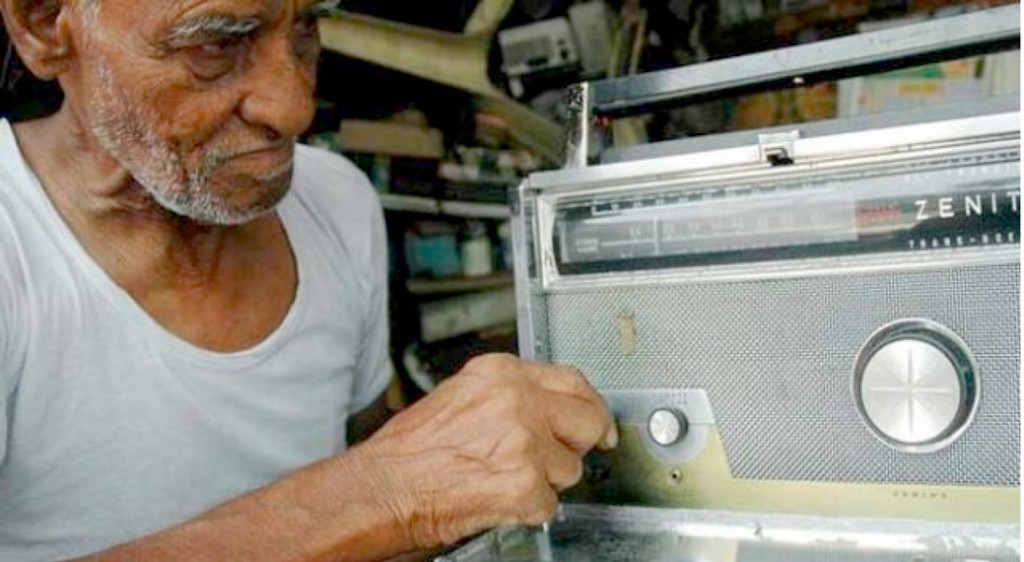Anand Akela from Marwar Mundwa. Allah Rakha from Jhumritalaiya. Sharad Agarwal from Rajnandgaon. And countless others from Yeotmal, Mancherial, Nanded, Karim Nagar, Nepa Nagar, Indore, Rajkot, Beed, Ujjain and Dhanbad. People to whom I’ll forever be indebted for introducing some of the greatest Hindi film songs to me. If Akashvani’s Aap ki Farmaish in which the names of all these listeners figured regularly brought me so many evergreen melodies, programmes like Sangeet Sarita not only played film songs based on ragas, but also presented classical music renderings of the same ragas, thus adding to the listener’s appreciation of good music.

The top billing among these often far-flung locations rarely heard of outside the radio must go to Jhumritalaiya. According to Wikipedia, Jhumritalaiya or Jhumri Telaiya, a small town in Jharkhand, became famous in the 1950s owing to its connection with Radio Ceylon and All India Radio’s Vividh Bharati. The largest number of requests for film songs addressed to the channels came from Jhumritalaiya.
The trend started in the early 1950s, when mica businessman Rameshwar Prasad Barnwal started mailing 20 to 25 song requests to Radio Ceylon daily. Regularly hearing Barnwal’s name on the radio inspired paan shop owner Ganga Prasad Magadhiya and electronics shop owner Nandlal Sinha to similarly mail a large number of song requests. The growing fame of these three led to the emergence of a song-request fad among the people of the town. Young listeners from the town would compete among themselves to send out the most song requests. Subsequently, other towns also started competing with Jhumari Telaiya by sending out a large number of song requests. In the 1980s, a radio listeners’ club was formed in the town.
The largest number of requests for film songs addressed to the channels came from Jhumritalaiya
I cherish the memory of listening to some of the most famous songs of all time based on classical music songs like Man tarpat Hari darshan ko aaj, Poocho na kaise maine rayn bitayi, Jyoti kalash chhalke, Manmohana bade jhoote, Madhuban me Radhika nache re, or Zindagi bhar nahin bhulegi yeh barsaat ki raat, each one a blockbuster — but also other melodies that did not quite hit the jackpot in box office terms, yet touched a chord with a whole generation of listeners.
I have in mind little gems that have stood the test of time, gems that I would probably never have come across but for Vividh Bharati. Of course, O sajana of Parakh belongs to the first category of all-time favourites, but the other Lata Mangeshkar beauty from the same film, Mila hai kisika jhumka, is a typical Salil Chaudhuri charmer, whose first acquaintance I owe to some anonymous listener from Ajmer or Sriganganagar.
Jaoon kahan bata ae dil from Chhoti Bahen is a subtly poignant Mukesh-Shanker Jaikishen composition whose music director I for long erroneously believed to be Sardar Malik, the creator of the haunting Mukesh melodies Saranga teri yaad mein and Haan deevana hun main, songs from the film Saranga which bring back memories of sleepy afternoons with a book in hand and a transistor radio by your side.
I have in mind little gems that have stood the test of time, gems that I would probably never have come across but for Vividh Bharati.
Songs heard on radio can be misleading. Kohinoor, a film released in the 1960s, had a rich slew of delightful raga-based melodies. From Madhuban mein Radhika nache re, to Do sitaron ka zameen par hai milan aaj ki rat, or Dhal chuki shame gham, every one of them promises a scene of serious purpose or sentimental romance, but what you saw on screen was a spoof-like treatment by the brilliant comic genius of Dilip Kumar with Meena Kumari, adding to heady music by Team Naushad-Shakeel Badayuni-Mohammed Rafi/ Lata Mangeshkar.
The same musical foursome had been a runaway success in Baiju Bawra, whose cast had Bharat Bhushan and Meena Kumari in the lead. Incredibly — well not so incredibly, for it was almost the norm in Hindi film music — the classic Man tarpat Hari darsan ko aaj was the result of a collaboration among a trio of Muslims in Shakeel Badayuni, Naushad, and Mohammad Rafi, as were the songs in Kohinoor, which offered the additional dimension of both the lead actors being Muslim as well.

If Bharat Bhushan was not exactly known for his histrionic ability, he proved a credible Baiju in Baiju Bawra, but gave a relatively wooden performance in Barsaat ki Raat, in which he got to lip-sync for the all-time favourite Zindagi bhar nahin bhulegi. The actor’s portrayal of Mirza Ghalib in the eponymous film was unaffected if touchingly naïve, with at least one moment of delicious nonchalance when the poet swaggers away on hearing a wandering mendicant sing praise of the incomparable Ghalib, though he does not recognise him:
Hai aur bhi duniya men sukhanvar bahut acchey
Kahten hain ke Ghalib ka hai andazen bayan aur
(There are doubtless many good poets in this world
But Ghalib has a unique style all his own, they say)
An extreme case of a complete ham getting to ‘sing’ some of the greatest songs in Hindi cinema was Pradeep Kumar, the star of movies featuring some unforgettable melodies by music director Roshan, with Man re tu kahe na dheer dhare from Chitralekha, my personal favourite among that composer’s delightfully original numbers based on classical ragas.
The trend started in the early 1950s, when mica businessman Rameshwar Prasad Barnwal started mailing 20 to 25 song requests to Radio Ceylon daily.
While Naushad’s were probably the creations I most frequently heard on these wonderful broadcasts on Vividh Bharati — not to mention Jai Mala for India’s jawans, and the Urdu programme of Akashvani relayed at 3pm or so — Sachin Dev Burman was never far behind, while Madan Mohan, C Ramachandra, Jaidev, Roshan, Chitragupt, Ghulam Mohammed, Ravi, and Shanker-Jaikishen kept you in constant supply of delightful compositions, each composer affixing his trademark touch to his songs.
And Khayyam! Was there ever a more completely original music director? Particularly engaging was his use of Punjabi folk, Pahadi dhun and ghazals. It was thanks to Vividh Bharati that I first heard that priceless Rafi-Suman Kalyanpur duet Thehariye hosh men aa loon that Khayyam composed for the film Mohabbat isko kahten hain. His Pahadi delights included Lata Mangeshkar’s Baharon mera jeevan bhi savaaro from Akhari Khat and his wife Jagjit Kaur’s Tum apna ranj-o-gham from Shagun, not to mention the title song from Kabhi Kabhi, sung by Mukesh.
Thank you, the rasikas of Jhumritalaiya, for your exquisite taste in film music and diehard devotion to the cause of making great Hindi songs available to millions of Indian listeners for decades — until, at first, television swamped us, and later, Youtube and technology came to bring us our farmaish at a mouse click or a mere mobile phone swipe.
The writer is an author and former editor of Sruti magazine.







